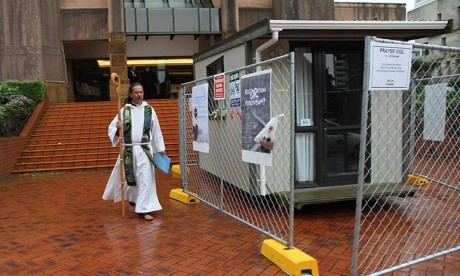Rosemary McLeod referred to Bishop Justin Duckworth’s week in a monastic cell in front of Saint Paul’s Cathedral as a “performance piece” (Opinion, October 17).
Justice Minister Judith Collins implied it was ridiculous and suggested this “sort of display” is “why people are leaving the Anglican Church”.
Perhaps the symbol of a fenced in cell is upsetting to the journalist and the politician but Bishop Duckworth was just doing his job, albeit in a colourful way.
Last week Anglican churches around the country were focusing on penal reform. We have some serious problems in New Zealand. We incarcerate people at a greater rate than almost all like countries and we have a very high recidivism rate.
This is a problem for all of us because a prison system that is not rehabilitating people becomes a school for further crime. That in turn puts us all at risk.
The bishop’s question is, “Do we want a system that simply punishes offenders or do we want one that changes behaviour and leads to less reoffending?”
The time in the cell drew public attention to the question and allowed him a week to contemplate and pray.
We all understand the former. The latter is perhaps a mystery for some, but you have to admit that is what you would expect of a bishop.
So what is the substance? The rate of imprisonment in New Zealand more than doubled from 91 per 100,000 people in 1987 to 197 per 100,000 in 2010. Today’s figure shows a small improvement, sitting on 192.
These very high imprisonment rates are well above like countries with the exception of the United States. Britain imprisons 148 per 100,000, Australia 130, Canada 118 and France 105.
The picture gets worse if we look at the imprisonment of Maori. They are imprisoned at a rate of 700 per 100,000, three and a half times more than non- Maori, or over five times more than the total Canadian rate.
So are New Zealand’s streets safer as a result of all this very expensive locking up? It does not appear so because the recidivism rates are very disturbing. Around half New Zealand’s prisoners (49 per cent) return to prison having reoffended over the four year period after being released.
The figures suggest some smart thinking is needed. We lock up more people than other like countries. We have a shameful ethnic bias within those figures and a very high reoffending rate.
The bishop didn’t blame the Government or the justice or correction systems. He stated that his vigil was not a protest. It was a call to think, discuss and act. This problem has grown over the last 25 years under successive governments, but there are hopeful signs within the corrections and justice systems. Continue reading
Sources
- Charles Waldegrave in Stuff
- Image: Anglican Taonga
Charles Waldegrave leads the Anglican Church’s family centre social policy research unit.
